About the Editor

KATHRYN CULLEN-DUPONT is the author of The Encyclopedia of Womens History in America and Elizabeth Cady Stanton and Womens Liberty ; co-author of Womens Suffrage in America and Womens Rights on Trial ; contributor to Academic American Encyclopedia ; permanent consultant for Groliers New Book of Knowledge encyclopedia; and frequent guest lecturer at educational institutions. She lives in Brooklyn, New York, where she is at work on a novel.
American Women Activists Writings
First Cooper Square Press edition 2002
This Cooper Square Press hardcover edition of American Women Activists Writings is an original publication. It is published by arrangement with the editor.
Copyright 2002 by Kathryn Cullen-DuPont
Every effort has been made to seek out and to obtain permissions from the copyright holders of the pieces selected for inclusion in American Women Activists Writings . Pages 615617 constitute an extension of the copyright page.
All Rights Reserved
No part of this book may be reproduced in any form or by any electronic or mechanical means, including information storage and retrieval systems, without written permission from the publisher, except by a reviewer who may quote passages in a review.
Published by Cooper Square Press,
An Imprint of Rowman & Littlefield Publishing Group, Inc.
150 Fifth Avenue, Suite 817
New York, NY 10011
Distributed by National Book Network
Library of Congress Cataloging-in-Publication Data
American women activists writings: an anthology, 16372002 / edited by Kathryn Cullen-DuPont. 1st Cooper Square Press ed.
p. cm.
Includes bibliographical references.
ISBN 0-8154-1185-5 (cloth : alk. paper)
1. WomenUnited StatesHistorySources. 2. Women social reformersUnited StatesHistorySources. 3. Women civic leadersUnited StatesHistorySources. I. Cullen-DuPont, Kathryn.
| HQ1410 .A45 2002 |
| 305.4'0973dc21 | 2001053728 |
 The paper used in this publication meets the minimum requirements of American National Standard for Information SciencesPermanence of Paper for Printed Library Materials, ANSI/NISO Z.39.48-1992.
The paper used in this publication meets the minimum requirements of American National Standard for Information SciencesPermanence of Paper for Printed Library Materials, ANSI/NISO Z.39.48-1992.
Manufactured in the United States of America
For my mother-in-law,
Barbara DuPont
and in memory of my father-in-law,
Joseph G. DuPont
Acknowledgments

I would like to thank my editor, Michael Dorr; assistant editor Ross Plotkin; production editor Julie Kirsch; my literary agent, Elizabeth Frost-Knappman; the staffs of the New York Public Library, the Bancroft Library at the University of California, Berkeley, and the Sophia Smith Collection at Smith College; and all those who so generously granted permission to include their writings in this anthology. I would also like to thank my husband, Joseph DuPont; my children, Melissa and Jesse Cullen-DuPont; and my parents, Martin and Arlene Cullen, for their continued interest and support.
Chronology of Events

1637 | Anne Hutchinson is tried by the civil court of the Massachusetts Bay colony and convicted of traducing the ministers and their ministry. |
1638 | Anne Hutchinson is tried before the clergy and the church of Boston; she is convicted of heresy and excommunicated. |
1775 | Abigail Adams writes to her husband, John Adams, to request that he and the Continental Congress include womens rights in the new nations code of laws. |
1821 | Lucretia Mott is recorded as a Quaker minister. |
1823 | Catharine Beecher, with her sister Mary, opens what becomes the Hartford Female Seminary. |
1826 | Sojourner Truth escapes slavery. |
1832 | Maria W. Stewart delivers her first speech, at Franklin Hall, Boston. |
1833 | Maria W. Stewart gives her Farewell Address. |
1836 | Angelina Grimk writes An Appeal to the Christian Women of the South and Sarah Grimk writes an Epistle to the Clergy of the Southern States. |
1837 | The Massachusetts clergy reads from the orthodox churchs pulpits a Pastoral Letter denouncing the Grimk sisters for speaking to mixed audiences of men and women. Catharine Beecher adds her own criticism in An Essay on Slavery and Abolitionism, with Reference to the Duty of American Women. |
Mount Holyoke Seminary, founded by Mary Lyon, opens its doors. It will become Mount Holyoke College. |
1840 | Elizabeth Cady Stanton accompanies her husband to the World Anti-Slavery Convention in London, England. When female delegates are refused participation on grounds of gender, Stanton, Lucretia Mott, and other women speak of beginning a womens rights movement upon their return to the United States. |
1845 | Margaret Fullers Woman in the Nineteenth Century is published. |
1847 | Elizabeth Blackwell begins her medical training at Geneva University. |
Lucy Stone graduates from Oberlin College. The colleges policy calls for the graduation speeches of female students to be read aloud on their behalf by male students. Refused permission to read her own speech, Stone insists that it remain unread. |
1848 | Elizabeth Cady Stanton, Lucretia Mott, and others organize the Seneca Falls Convention, and the womens movement in the United States officially begins. |
1851 | Sojourner Truth delivers her speech Aint I a Woman. |
The True Remedies for the Wrongs of Woman by Catharine Beecher is published. |
1855 | Lucy Stone and Henry Blackwell marry. They use the occasion to protest the inequities in marriage law, and Lucy Stone retains her surname. |
1859 | Frances Ellen Watkins Harpers The Two Officers appears in the Anglo-African Magazine . It is believed to be the first short story published by an African American. |
1860 | The Reverend Theophilus Packard, exercising his discretion as a husband, has his wife, Elizabeth Packard, committed to the Illinois State Hospital for the Insane. |
1864 | At the conclusion of Packard v. Packard , Elizabeth Packard is found sane and given her liberty. She begins her campaign for legislative reform. |
1869 | The womens movement splits into two factions, represented by the National Woman American Suffrage Association, headed by Elizabeth Cady Stanton and Susan B. Anthony, and the American Woman Suffrage Association, headed by Lucy Stone. |
1870 | Henry Blackwell reads Catharine Beechers statement in opposition to womens suffrage to those attending a convention of the American Woman Suffrage Association. |
Victoria Woodhull becomes the first woman to run for election to the U.S. presidency. |
1871 | Anna Howard Shaw receives her license to preach in the Methodist Protestant Church. |
Abigail Scott Dunniway begins publication of her suffrage newspaper The New Northwest . |


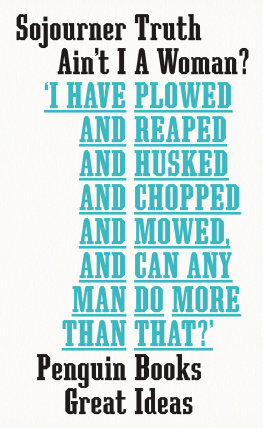
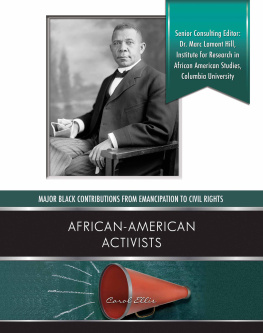
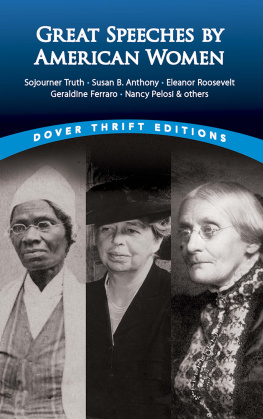
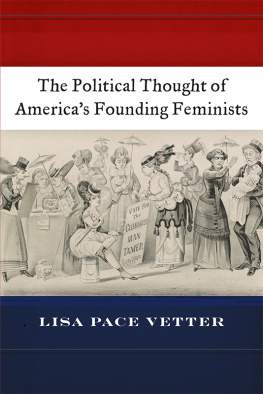
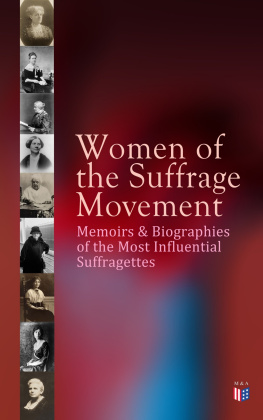

 The paper used in this publication meets the minimum requirements of American National Standard for Information SciencesPermanence of Paper for Printed Library Materials, ANSI/NISO Z.39.48-1992.
The paper used in this publication meets the minimum requirements of American National Standard for Information SciencesPermanence of Paper for Printed Library Materials, ANSI/NISO Z.39.48-1992.